1
only once Mohamad saw a rising sun. He died within his first day of life. The Rohingya got stranded at a makeshift-camp around this bridge at the river Naaf (Bangladesh-Burmese border). Within a period of one month 25 refugees died because of malnutrition, exhaustion and lack of medical assistance

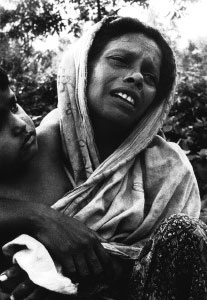
2
agony in the aracanese states of Burma: this family fled the burmese Soldateska and arrived at Kutupalong-Camp in Bangladesh. But its to late for their youngest daughter. The four-year-old died because of exhaustion and is buried on the outskirts of the camp
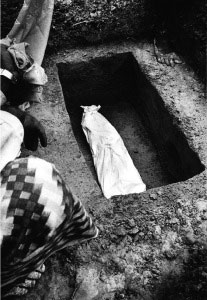
3
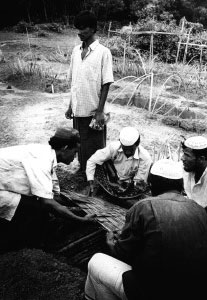
4
how to measure or comprehend the terror - or perhaps it's the love - that propels a man to leave his family, quite possibly forever, and climb penniless into a boat to find uncertain work a thousand miles away in a place where he knows he'll be both unwelcome and liable to arrest? For that matter, what hellish existence could send a family fleeing to a refugee camp where conditions resemble the 12th century?
5
"Stop Killing in BURMA" - a torn poster is hanging from the wall at a buddhist temple during a meeting of burmese opposition groups outside Coxx´ Bazar in Bangladesh
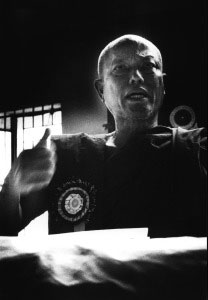
6
buddhist monk argues during a meeting of burmese opposition groups outside Coxx´ Bazar
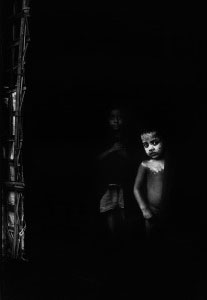
7
Kutupalong-Camp: it is an obscenity, this camp, a festering hell of lost hope and inhuman squalor. No water, power, schools or medicine. Occasional stoop-labor jobs carrying bricks or making salt. Huts made of leaves and branches. There is no music. "the worst conditions you could imagine anywhere on earth" says an international aid worker. "total despair" says another...
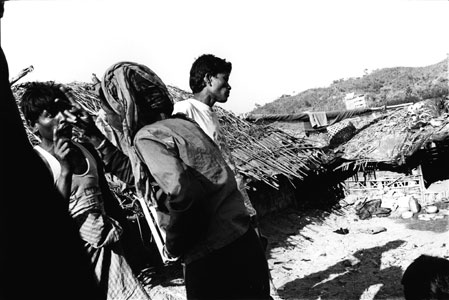
8
no country claims the Rohingya. No country welcomes them.
For many, Islam is the only sanctuary left
9
view from a graveyard towards Kutupalong-Camp
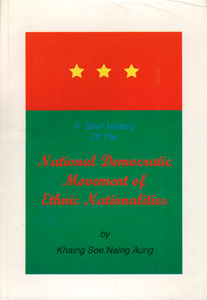
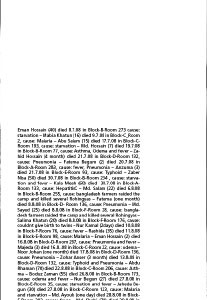
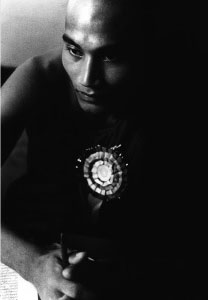
10
buddhist monk during a meeting of burmese opposition groups at a buddhist temple
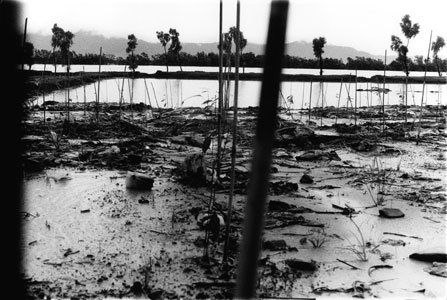
11
only once Mohamad saw a rising sun: he died within his first day of life. The Rohingya got stranded at a makeshift-camp at the river Naaf (Bangladesh-Burmese border). Within a period of one month 25 refugees died because of malnutrition, exhaustion and lack of medical assistance
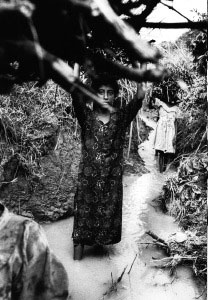
12
every day more Rohingya arrive at the Bangladeshi camps, stateless, sun-blasted refugees carrying their meager bundles. The newcomers, largely from the aracanese states of Burma, are often so traumatized that they are unable to tell aid workers what they have fled
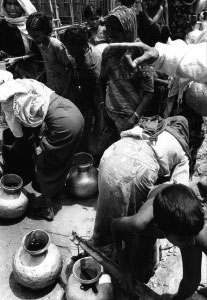
13
the Rohingya number about 750.000 in Burma. But the military junta does not recognize them as one of the 135 "national races" in the mostly Buddhist nation. And so, in the face of forced labor, arbitrary arrest, stolen land and starvation, many flee their country to the makeshifts camps like Kutupalong in Bangladesh
14
difficult enough are their journeys from Burma to the camps. Even more dangerous are the attempts by thousands of Rohingya men and boys to emigrate each year, starting with perilous sea voyages to Thailand. After that comes an overland trek to Malaysia, a country that has become a kind of Muslim El Dorado for the Rohingya. There might be friends or family connections there, and perhaps jobs that allow for money to be sent to families back in the camps
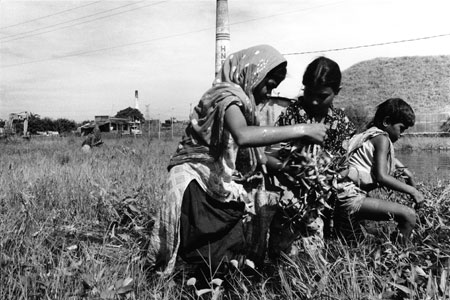
15
another million Rohingya are scattered about the world -there has been a major diaspora from South Asia in recent decades- and they have flung themselves from Saudi Arabia to Pakistan to Thailand to Indonesia. The men lay asphalt and pour cement in Riyadh. They haul fishing nets in the Andaman Sea. They pull rickshaws in Jakarta. The children, with their small hands, peel shrimp and weave carpets in Karachi
16
17
mosque near Farmsgate, Dhaka: no country claims the Rohingya. No country welcomes them. For many, Islam is the only sanctuary left
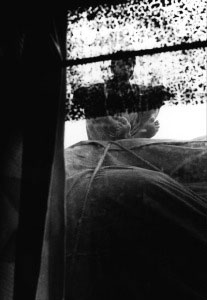
18
between Coxx´ Bazar and Dhaka
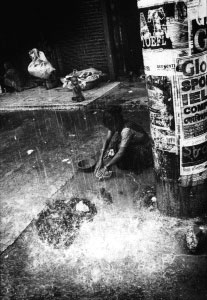
19
Farmsgate, Dhaka
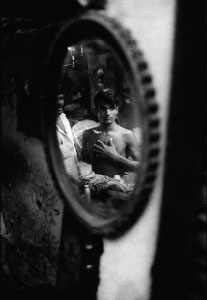
20
male prostitute at a vegetable market in Dhaka
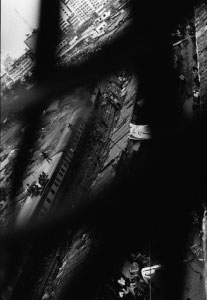
21
a train from Chittagong is reaching the capital of Bangladesh: one million Rohingya are scattered about the world -there has been a major diaspora from South Asia in recent decades- and they have flung themselves from Saudi Arabia to Pakistan to Thailand to Indonesia. The men lay asphalt and pour cement in Riyadh. They haul fishing nets in the Andaman Sea. They pull rickshaws in Jakarta. The children, with their small hands, peel shrimp and weave carpets in Karachi

22
…a peaceful demonstration by Karen all over the country was staged on February 11, 1948, in which over 400.000 Karen took part. The carried banners contained four slogans:
- give the Karen State at once
- show the Burman one Kyat and the Karen one Kyat
- we do not want communal strife
- we do not want civil war
the slogans of the Karen in this mass demonstration voiced the same desire as the three slogans of the British Colonies after the Second World War: Liberty, Equality, and Peace. They followed the established democratic procedures in their request for a Karen state
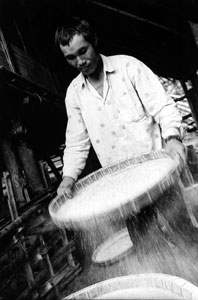
23
harvest in Ko Thulei (land of flowers) ...many villagers have been forced to work as porters for several months; they are deliberately starved, and regularly beaten, raped, or murdered. When burmese soldiers enter a village, they shoot the villagers who try to escape. Some of the villagers have been accused of helping the Karen and then have been killed. In certain areas, villagers have been forced to leave their villages and have been moved to camps
24
in the border town of Mae Sot many Karen work as day laborers. They left their refugee camps or enter Thailand illegal. Police arrests whom ever they get and deport them back to Burma
Burma is a multi-national country, inhabited also by Kachin, Arakanese, Karenni, Lahu, Mon, Pa-O, Palaung, Shan and Wa. After independence, these ethnic races were also denied the basic rights of freedom, self-determination, and democracy. Hence, almost all the other nationalities in Burma have also taken up arms to fight against the Burmese Governnent for their own self-determination, and are now united in the National Democratic Front (NDF):
- Arakan Liberation party (ALP)
- Chin National front (CNF)
- Kachin Independence Organisation (KIO)
- Karen National Union (KNU)
- Karenni National progressive Party (KNPP)
- Kayan New Land Party (KNLP
- Lahu National Organisation (LNO)
- New Mon State Party (NMSP)
- Wa National Organisation (WNO)
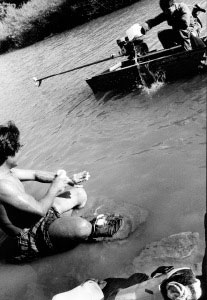
25
Thai-border near Mae Sot: with small boats Karen cross the Moi-River to carry weapons, medicaments and nutrition into the Ko Thulei
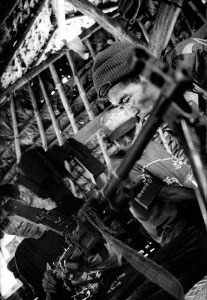
26
Karen preparing for an ambush
27
Karen take position to secure a route for supplies in the 5th Brigade area
28
Karen-school in the jungle ...there is nothing, no pencils, no books. Many of the children quit school to join the rebels
29
a platoon enters a village to protect farmers and their harvest against the burmese army
30
"we don't need men, we need equipment,". "If we had 50.000 weapons, tomorrow we would have 50.000 soldiers."
31
Karen-Rebel helping out an old woman
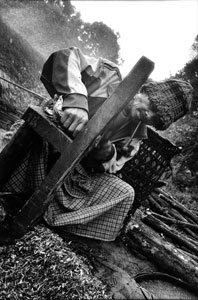
32
...bitter harvest, every hand is needed now. The burmese army kill, rape, destroy fields and burn villages of the Karen in revenge for their support of the rebels
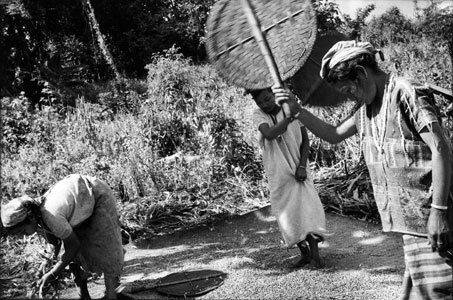
33
many villagers have been forced to work as porters for several months; they are deliberately starved, and regularly beaten, raped, or murdered. When burmese soldiers enter a village, they shoot the villagers who try to escape. Some of the villagers have been accused of helping the Karen and then have been killed. In certain areas, villagers have been forced to leave their villages and have been moved to camps
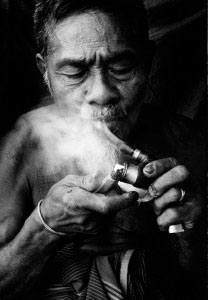
34
Saw T.: he is training the 101st Brigade in close rage combat
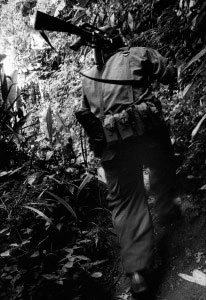
35
36
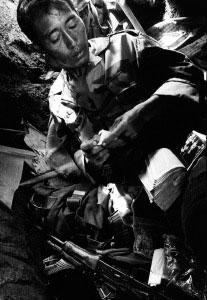
37
"the Battle of Solferino lasted from sunrise to sunset on one day. The Angolan civil war lasted thirty years. The Afghan war has gone on since 1979. The butcheries in Rwanda and Burundi began with the independence in the sixties and have been recurring ever since. In times past, war observed its own ecological limits. Conflicts burned themselves out as they used up soldiers and supplies and food. Now war is able to outrun the carrying of the local ecology"
The Warrior´s Honor by Michael Ignatieff
his warname is "One-Man-Army", he is on mission for up to ten days. Behind the lines he kills as much soldiers as possible
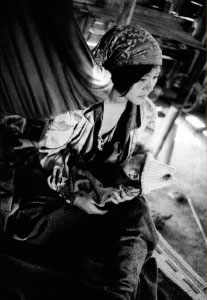
38
there are no medicaments: a mother is desperately awaiting treatment for her Malaria-infected child ...for nearly 60 years, the country has been embroiled in civil war. More than 1 million people have been displaced and hundreds of thousands of ethnic minorities have fled to refugee camps in neighboring Thailand escaping forced labor, rapes, killings and imprisonment. The situation has deteriorated so badly that the U.N. Security Counsel added Burma to its formal agenda
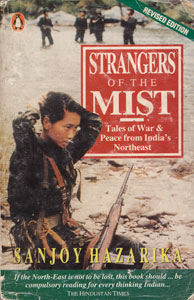
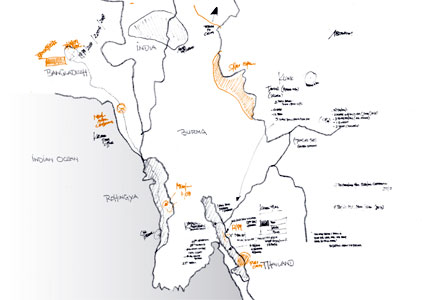


39
Karen refugee in the border town of Mae Sot